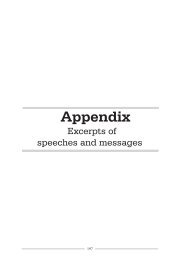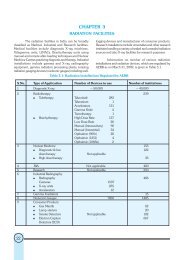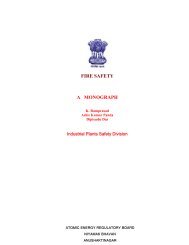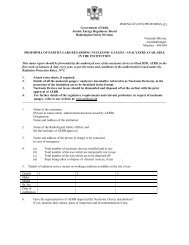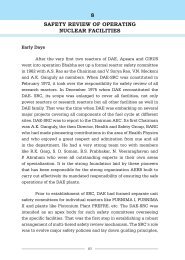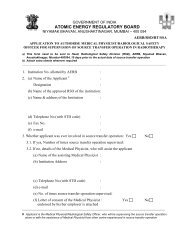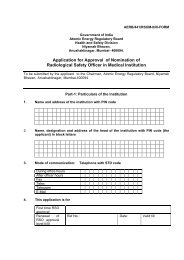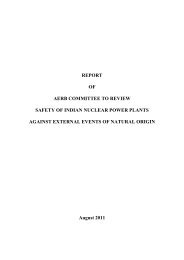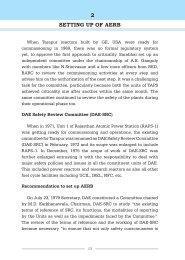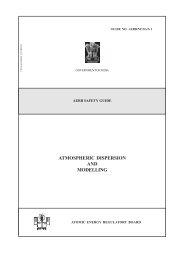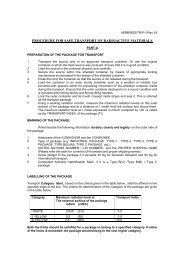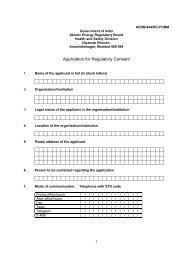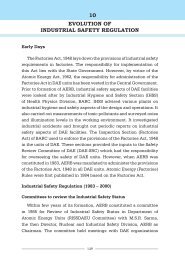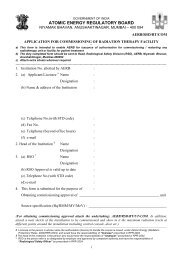Consenting Process for Radiation Facilities - Atomic Energy ...
Consenting Process for Radiation Facilities - Atomic Energy ...
Consenting Process for Radiation Facilities - Atomic Energy ...
You also want an ePaper? Increase the reach of your titles
YUMPU automatically turns print PDFs into web optimized ePapers that Google loves.
should be volunteers drawn from a large population, after obtaining their<br />
in<strong>for</strong>med consent. Any biomedical work involving radiation should serve a<br />
useful purpose and the results should be applied <strong>for</strong> beneficial knowledge in<br />
the subject. It is also important that such results are not already available.<br />
Any unnecessary exposure to individuals should be avoided. An Ethical<br />
Review Committee of the hospital should review all the proposed biomedical<br />
procedures, be<strong>for</strong>e Approval of AERB is sought.<br />
3.16.3.2 Commissioning and Operation<br />
The AERB shall review applications <strong>for</strong> approval of a procedure <strong>for</strong><br />
biomedical research. Such studies shall be undertaken in laboratories having<br />
AERB approval <strong>for</strong> handling radioisotopes in unsealed <strong>for</strong>m (eg. nuclear<br />
medicine laboratory)<br />
The applicant should establish the procedures through animal studies, prior<br />
to seeking permission <strong>for</strong> biomedical programme on humans. The report along<br />
with details of the biomedical programme should be submitted to the Ethical<br />
Review Committee of the institution. The Ethical Review Committee’s<br />
recommendation that the procedure adopted might have beneficial results is<br />
an essential requirement <strong>for</strong> carrying out the programme. The applicant should<br />
follow the Helsinki Declaration (18 th World Medical Assembly, Helsinki,<br />
1964) in selecting the human subjects <strong>for</strong> the biomedical research.<br />
Based on the inspection and assessment of facilities and availability of trained<br />
manpower to carry out the required research work, AERB may grant<br />
Registration <strong>for</strong> the said biomedical research with certain stipulations on<br />
radiation safety. The Consentee should follow the stipulations and report to<br />
AERB on the safety aspects of the research.<br />
The application <strong>for</strong>mat <strong>for</strong> obtaining the Registration <strong>for</strong> the biomedical<br />
research/studies is given in Annexure 45.<br />
3.16.3.3 Lead Time <strong>for</strong> Submission/Availability of Documents<br />
The lead time <strong>for</strong> submission of documents at any stage of consenting process<br />
is 30 days be<strong>for</strong>e the desired date of consent and the documents should be<br />
complete in all respects <strong>for</strong> review by AERB.<br />
3.17 Radio-Immuno Assay (RIA)<br />
3.17.1 General<br />
Radio-immuno assay (RIA) is an in-vitro procedure in which radioactivity is<br />
not administered directly to patients. Tests are carried out by adding<br />
radioactivity to blood samples drawn from patients. Since RIA is a laboratory<br />
process, the source storage, assay and waste handling areas need to be<br />
demarcated and contamination prevented, contained or controlled.<br />
73



